Enjoy.
WARNING: There’s no way for me to explain why these episodes deserve Top Ten treatment without giving out a SPOILER here and there. So, now you’re warned.
And so, without further preamble . . .
TEN: “SUPERSTAR”
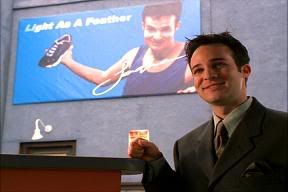
Season Four, Episode 17, Air date: 4/4/00
Written by Jane Espenson, Directed by David Grossman
Plenty of Buffy episodes deal with magic spells and curses affecting the entire population of Sunnydale. Number Ten in Mick’s Ten Best of Buffy is one of the only episodes in which not only is the spell working as soon as the episode begins, but it actually changes the opening credits.
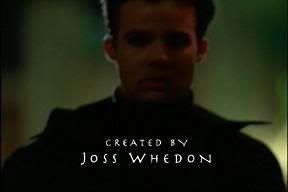
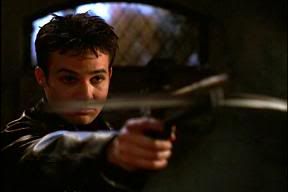
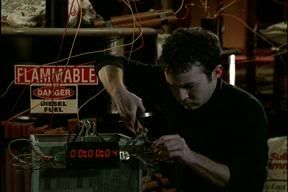
Mixed in with the credits are shots of a short, baby-faced geek brandishing crossbows, disarming time bombs, and just all-around trying and failing to appear like a mixture of James Bond and Buffy’s broody ex-boyfriend. Longtime watchers will recognize him as Jonathan, a Sunnydale High misfit who did little more than take beatings from jocks and monsters alike in the second and third seasons of the show. Before “Superstar” his only prominent appearances included a botched suicide attempt in Season 3’s “Earshot” and his presentation of a class award to Buffy later that season in “The Prom”.
Jonathan creates a whole new world in “Superstar”. Along with usurping Buffy’s position as premiere superhero of Sunnydale, in his world Jonathan starred in The Matrix, invented the Internet, produced a line of successful Big Band albums, and apparently his trumpet playing is the fire that fuels the passion of Xander and Anya’s relationship.
Besides the clever handling of the opening credits and the introduction of the spell, what I liked most about this episode was how Jonathan’s motives and actions were dealt with. While it’s clear Jonathan is the antagonist of the episode and that he wants to keep his illusion alive, he’s never depicted at being at all malicious. At worst, when Buffy begins to figure out what’s going on, he’s evasive and conflicted. When he uses his new status as confidant to both Buffy and Riley (Buffy’s Season 4 love interest), as condescending a prick as he is, he sincerely wants to help them. He’s part of something that will become a common theme in Mick’s “Ten Best Buffy”: an example that the more human Whedon & Co. rendered their bad guys, the more the characters enriched the story.
NINE: “HUSH”
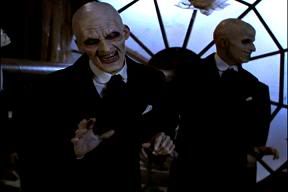
Season 4, Episode 10, Air date: 12/14/99
Written and Directed by Joss Whedon
The famous silent episode of Buffy (well, not COMPLETELY silent), “Hush” introduced fans to perhaps the creepiest villains of the series: the wordless, grinning ghouls known as The Gentlemen.
A lot is made of the silent aspect of “Hush,” and I won’t deny it’s impressive and entertaining. Perhaps my favorite scene involves Giles educating Buffy and the Scoobies on The Gentlemen while using some bloody transparencies on a projector with musical accompaniment.

But with or without dialogue, the stars of this episode are The Gentlemen. The physical aspects of monsters on Buffy tended to be adequate at best, campy at worst. It was okay, you accepted it because it was part of the show’s charm, but it was rare that the creative staff managed to design a very simple monster that was genuinely scary. The Gentlemen are such beasts. Caught in perpetual steel grins, floating a few feet above the pavement, and exchanging polite and silent niceties with each other even as they cut out a victim’s heart, The Gentleman were - without a doubt - the most bone-chillingly creepiest villains to ever go toe-to-toe with Buffy. The silent aspect of the episode, for me, was just icing on the cake.
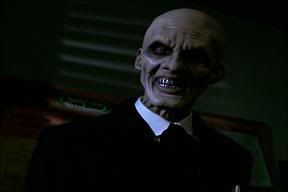
EIGHT: “RESTLESS”
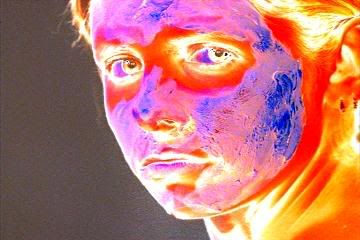
Season 4, Episode 22, Air date: 5/23/00
Written and Directed by Joss Whedon
“Restless” is unique in a lot of ways, but first and foremost it differs in that it was the Season 4 finale, and yet was the only finale of any Buffy season that didn’t feature the climax between the forces of good and evil for that particular year. Instead, it deals with a danger that arises after the Big Bad has already been vanquished.
In the previous episode, “Primeval”, Buffy defeats a demon/human cyborg named Adam by temporarily merging her spirit with those of Xander, Giles, and Willow. In “Restless”, we find that the spirit of the first Slayer was offended by the merging as she seeks to murder Buffy’s three closest allies in their dreams.
Since most of the episode features dream sequences, there’s a lot of Lynch influence here, even a blatant homage (during Willow’s dream sequence there’s an abundance of red curtain everywhere). Since I’ve never experienced a dream nearly as coherent as most dream sequences you find on TV or film, I appreciate Whedon’s commitment to nonsense throughout the episode. Characters speak ridiculous lines of dialogue that sometimes hold metaphorical gems, and other times are just a little goofy.
Visually, it’s one of the most impressive episodes of the series. Scenes jump between color and black-and-white, locales merge so that Xander’s basement apartment seems to connect to just about every other setting in the series, and perfectly dreamlike scenarios pop up like Giles and Spike on playground swings or Giles doling out his usual research instructions to Xander and Willow, except singing them as a part of a rock band at the Bronze.
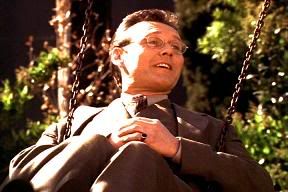
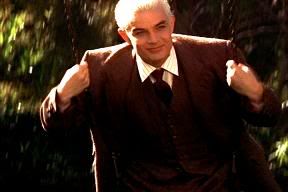
There’s also some prophesizing in the episode, some obviously intentional, some obviously not. In Buffy’s dream sequence, Tara utters the same words Dracula would speak to her in the first episode of Season 5, and follows it with “Be back before Dawn.” There’s a lot of other stuff in there, but it’s more fun to find it yourself.
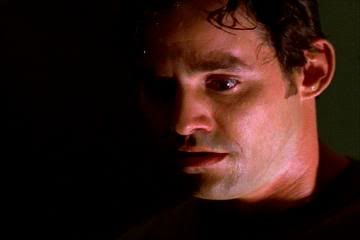
What I liked most about “Restless,” was that it was the first really sober and serious look at Xander’s character, particularly when it comes to how his situation with his parents has shaped him. It’s hinted at throughout the series, but it’s usually more of a joke than anything (usually used as fodder for Cordelia’s insults). While I know pretty much everything about Xander is treated as a joke, considering the setting (Southern California, in neighborhoods in which wallets aren’t exactly overflowing with food stamps), the “poor boy” jokes always left a bad taste in my mouth. It was one of the few aspects of Buffy that genuinely offended me, though obviously not enough to drive me away. “Restless” was the first time the surface of Xander’s relationship with his family was scratched, though unfortunately it pretty much ended there.
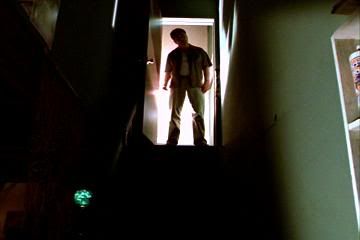
SEVEN: “GRADUATION DAY part 1 & 2"
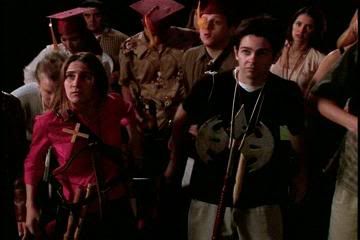
Season 3, Episodes 21 & 22, Air Dates: 5/18/99 & 7/13/99
Written and Directed by Joss Whedon
Along with offering a thundering climax to Buffy’s third season and helping to set up the first season of Angel, “Graduation Day” marked the end of an era. It would be a mistake to claim that the finale marked a “jump the shark” point, but the feel of the show was never the same once its heroes graduated. There was a particular chemistry between the characters in Sunnydale High that would never be repeated (which, you know, was kind of the point).
“Graduation Day” wasn’t particularly unique among Buffy season finales, other than the number of new developments. The episode gave viewers a surprising alliance between the students of Sunnydale High, the school’s destruction, the death of Principal Snyder as well as some of the more peripheral characters, Buffy severing ties with the Watcher’s Council, a final break-up between Buffy and Angel as well as a bloody pseudo-sex scene between the two, and an equally bloody climax to the conflict between Buffy and Faith the rogue slayer.
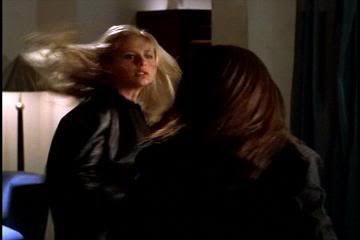
When choosing my Top Ten, I was usually careful not to choose something simply because it featured a so-called milestone event (e.g., episodes featuring the first appearances of characters who would later be key figures in the series, episodes featuring the deaths of regular characters, etc.), but “Graduation Day” is chock full of them. The episode is all about change, after all, and the new developments were necessary to get that across.
And you can’t go wrong with two of the series’ most engaging villains: Mayor Wilkins and his protege Faith. As much as I always felt Eliza Dushku was one of the least impressive actors on the series, the conflict between Faith and Buffy was riveting regardless. Harry Groener is equally fatherly, genial, and absolutely vicious as Mayor Wilkins. He remains one of the most genuinely intimidating and enjoyable Buffy bad guys. Both characters serve as examples of how the antagonists of Buffy could engage the audience better when they were more human than demon. Few of the “Big Bads” after Wilkins/Faith succeeded as well.
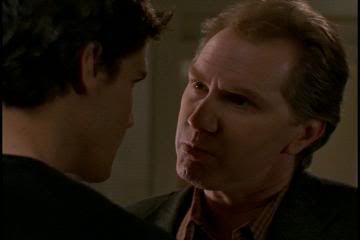
SIX: “BECOMING part 1 & 2"
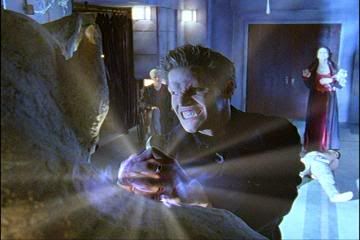
Season 2, Episodes 21 & 22, Air Dates: 5/12/98 & 5/19/98
Written and Directed by Joss Whedon
“Becoming” would, um, become a model for future episodes highlighting the early days of recurring vampire characters. Mixing the present story with scenes from Angel’s devilish past and the beginnings of his attempts to reconcile that past, “Becoming” gave its audience a prologue that rendered Buffy’s sacrifice of Angel that much more powerful.
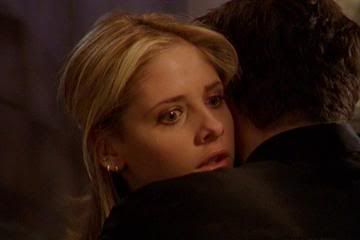
The sacrifice of Angel showed how Buffy had evolved into a woman who was willing to do the unthinkable for the sake of the world and simultaneously how she could never fit into the narrow role her heroic lineage dictated, served as a metaphor for the difficulty of letting go of destructive lovers, and gave Buffy viewers one of the most heartbreaking conclusions in the series (if not in the history of television).
On a side note, “Becoming” also rid the series of Kendra the slayer. Not only did this make way for Faith, but also did away with criminally fake accents until they reared their ugly heads again in Season 7.
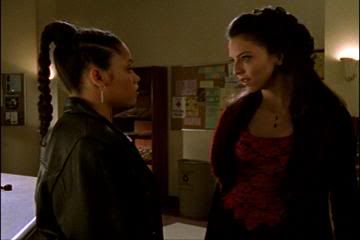
FIVE: “THE GIFT”
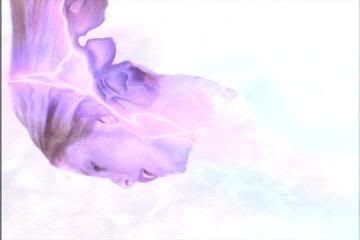
Season 5, Episode 22, Air Date: 5/22/01
Written and Directed by Joss Whedon
Never has a better episode of a TV series been made whose centerpiece was a fierce battle for the life of a character as annoying as Dawn Summers.
More than anything else, “The Gift” is a perfect example of how Whedon & co. manage to take a bunch of ridiculous elements that by all rights should never appear as anything but ridiculous and make them work. The combatants of the battle include a lovesick vampire, a Buffy decoy robot originally designed as a sex toy, and a vampire slayer battling a demon goddess with martial arts and a hammer stolen from a troll that would make mjolnir feel inadequate. Somehow, they make it work, and not just as a comedy.
Just as heartbreaking as “Becoming”, “The Gift” is something of a reflection of that earlier two-parter. As ill-equipped as she was for the viciousness required to fulfill her expected role, Buffy “rose to the challenge” when she sent Angel to hell. Finally and unequivocally unwilling to play the part that’s been forced upon her, Buffy sacrifices herself rather than even humor the possibility of again killing a loved one. It’s her final abandonment of everything she was supposed to be.
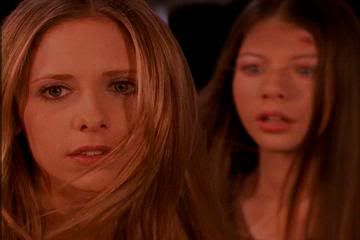
Considering her death at the end of the episode, the high quality of Season 5 as a whole, and the mixed quality of what would come after, one could argue that the series would have been better left at the end of “The Gift”.
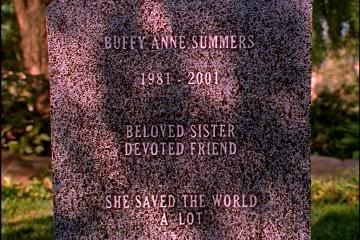
FOUR: "ONCE MORE, WITH FEELING"
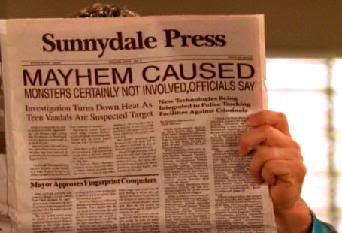
Season 6, Episode 7, Air Date: 11/6/01
Written and Directed by Joss Whedon
I hate musicals.
I worked for a local non-profit musical theater organization as a carpenter/stagehand for four summers. Before the end of the first summer, I was drawing pictures of men wearing Miss Saigon t-shirts hanging from nooses in letters to friends. And no, I don’t fucking think it’s so fucking nice to have fucking Dolly right fucking back where she fucking belongs. Fuck Dolly and everyone who looks like Dolly.
So I was not happy about the prospect of having to watch a musical episode of Buffy, but I was pleasantly surprised. "Once More, With Feeling" is now one of the most repeatedly played episode on my DVD player.
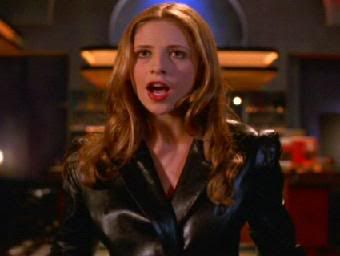
One of the things I hate most about musicals is the one-dimensional characterization. Everything, after all, is secondary to the silly singing and dancing. In the case of "Once More, With Feeling", I already knew the characters in question, and so there was never any threat that they would seem shallow or ill-conceived. Also, the sheer absurdity of the idea lent itself so well to the show.
As anyone who’s ever heard the opening theme from Firefly (which Whedon wrote) will attest, Joss Whedon has a rare gift of making his songs completely applicable to a very specific situation, while at the same time rendering them universal. Most of the episode's songs could be completely relevant outside Buffy. For example a line like "Nothing seems to penetrate my heart" from "Going Through The Motions" could easily be injected into songs having nothing to do with vampires or legendary woman warriors, but it makes the line that much better when Buffy sings it as she slams a stake into a vampire’s chest.
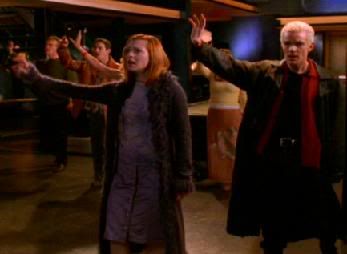
The episode also holds a special place for this humble viewer, in that - while the series finale was a year and a half way - it represents something of an emotional climax to the series. It was one of the last episodes with a unified group of Scoobies. Shortly afterwards Giles left for England, Xander and Anya split, Willow turned to the dark side, and Spike tried to rape Buffy. With the Summers home filled with Slayer-wanna-be’s in Season 7, the group of heroes would never really be the same. While I’m sure some may disagree, I feel it was also the series finale as far as quality was concerned. In fact my girlfriend (whose opinions have done quite a bit to influence my choices for the Top Ten) feels the rest of Season 6 may have suffered from the amount of time and energy put into the musical episode.
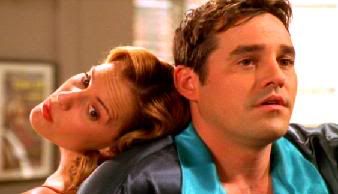
THREE: "FOOL FOR LOVE"
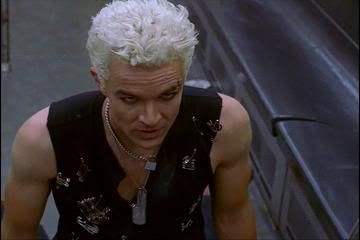
Season 5, Episode 7, Air Date: 11/14/00
Written by Douglas Petrie, Directed by Nick Marck
It isn't unreasonable to think that "Fool for Love" is on the list just because Spike is one of my favorite recurring characters on the show.
Still, I think its spot on the list is well-deserved. Despite the fact that one could argue its mixing of flashback scenes of Spike’s early history with the present storyline makes it little more than a clone of "Becoming", there’s a lot about "Fool for Love" that distinguishes it from the earlier two-parter and even improves upon it.
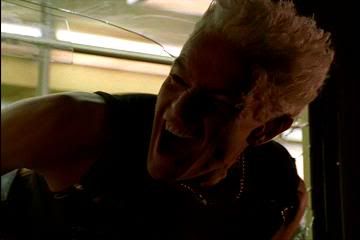
Unlike Angel or Drusilla, Spike is neither a psychotic nor a brooding guilt-machine. The element that makes him so fun to watch, an element that was never better illustrated than in "Fool for Love", is that he’s all about viciously reveling in what he is. When the 70's slayer smashes his head through the window of a subway train and he screams, the scream isn’t one of pain but of absolute joy. The joy of someone who's exactly where he wants to be.
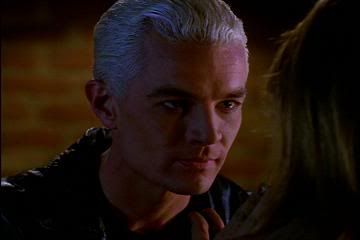
Also, while the flashbacks of "Becoming" served mainly as build-up to Angel’s fall, "Fool for love" both expanded on Spike’s character and acted as a parallel to Buffy’s inner conflict. When - in past and present - Spike brings his hands together inches from Buffy’s nose, it’s one of the most powerful moments ever between the two characters.
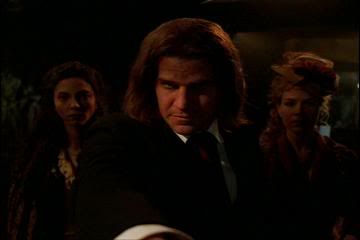
Another thing I love about the flashbacks - something I actually considered a downside until I was thinking about it in preparation for this review - is that, unlike "Becoming", Spike’s origin story is told directly from Spike’s lips and so the picture we get is tainted. Continuity hounds will remember, for example, that Angel was Spike’s sire (i.e., Angel turned Spike into a vampire). However, in "Fool for Love", it’s implied that Drusilla was his sire instead. Considering the sexuality inherent in Buffy vampirism, Spike might not like the idea of telling Buffy that it was a man who turned him, much less Angel. Likewise, Spike depicts Angel as a relatively tight-assed vampire who slaps Spike down every time he goes wild and takes risks. Of course, when Angel went to the dark side in Season 2 and allied himself with Spike and Drusilla, it was Spike who got nervous every time Angel got a little too eccentric.
TWO: "PASSION"
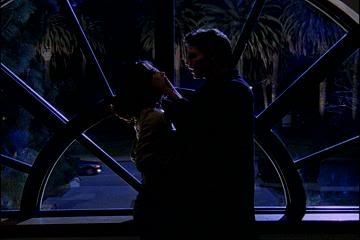
Season 5, Episode 17, Air Date: 2/24/98
Written by Ty King, Directed by Michael E. Gershman
In concept, direction, and acting talent "Passion" is uncontested in the entire Buffy collection. It’s as if Whedon injected super-soldier serum into the veins of everyone involved and said, "Oh, I forgot to tell you, this is the episode where you’re all fucking perfect."
There are a lot of things to love about "Passion". With the first death of a recurring good guy - Jenny Calendar - it’s one of the darkest episodes of the series. The funny’s still there (particularly with Cordelia’s attempts to de-invite Angel from her car), but it takes a backseat. Instead of the usual straightman/funnyman chemistry between Giles and Xander, the two nearly come to blows. Joyce’s conscious ignorance of her daughter’s weird night life begins to chip away when she finds out Buffy lost her virginity to Angel. Giles’s emotional walls come tumbling down when Jenny’s death sends him on a collision course with Angel (with a scene that makes you jump in your chair and cheer the first time you see it).
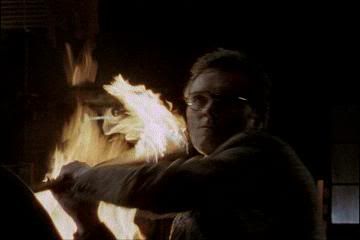
I’ve always felt Boreanaz was better as a villain than a hero and "Passion" saw his greatest portrayal of the soulless Angel. More than anything else, "Passion" conveys the sense that when it comes to Angel’s love for Buffy, nothing has changed. He still loves her, it’s just that love from a psychotic vampire (particularly one that’s been locked up for over a century) is not a good thing. Or, as Willow aptly puts it to Buffy, "You’re still all he thinks about." It's a feeling that was lost towards the end of the season, but that doesn't take away any of this episode's awesome power.
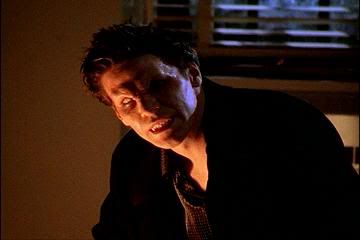
ONE: "THE PROM"
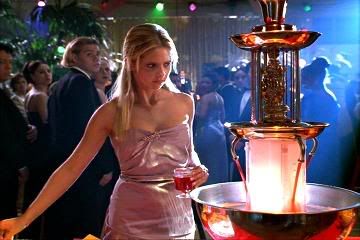
Season 3, Episode 20, Air Date: 5/18/99
Written by Marti Noxon, Directed by David Solomon
"The Prom" aired right before the two-part conclusion to the third season, "Graduation Day". Haunted by dark dreams as well as Joyce’s hard words, Angel is finally convinced that Buffy’s attachment to him will destroy her in the end, and breaks up with her. As she’s still dealing with the break-up, the Scoobies discover a Sunnydale High misfit plans on unleashing a pack of Hellhounds on the senior class during the prom. Determined to prevent the attack before so much as one demon can make its way to the school, Buffy orders the rest of the gang to the prom so they can enjoy what she suspects might be one of their final nights on Earth (by this point, the Scoobies are well aware of the Mayor’s apocalyptic plans and aren’t convinced they can stop them).
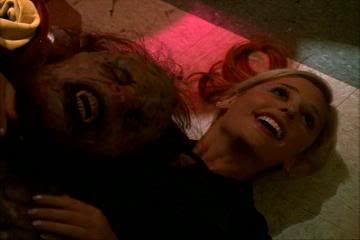
Buffy succeeds in stopping the hounds - killing the last one even as he tears at the gymnasium door - and eventually makes her way to the prom. Shortly afterwards, some of the most heartbreaking, tear-jerking, and bittersweet scenes ever aired on television unfold. If this show doesn’t make you cry, your heart’s more stonier than Ben Grimm.
As time goes by after your first viewing, the episode just becomes more powerful. For a regular viewer of the show it’s near impossible to watch the final slow dance of the episode without thinking about your own torrential teenage days, particularly when you consider how the assembled heroes would eventually scatter; either through death, transfer to another show, or, er, cheating-by-werewolf.

It’s also an example of how Whedon & Co. mastered the art of suspense. It's difficult for me to read or view any kind of action-oriented story and really doubt that the heroes will prevail. Whedon’s always kept me on my toes. Even more recently, with Serenity, I was all but convinced that he planned on killing the entire cast before the credits rolled. Usually, he keeps his viewers doubts alive with his unswerving willingness to mercilessly slaughter favorite characters, and usually in ways that are not nearly as dignified and heroic as Spike’s (temporary) death in the series finale. While part of me still protests the brutal end Anya met in the same episode, I have to admit that it succeeded in convincing me that the bad guys actually had a chance of winning.
With "The Prom" however, the creative team not only didn’t kill anyone, they gave viewers such a picturesque conclusion that you couldn’t help but think that things were two seconds away from going to complete Hell. It just felt too happy to not be followed up with a slaughterhouse.
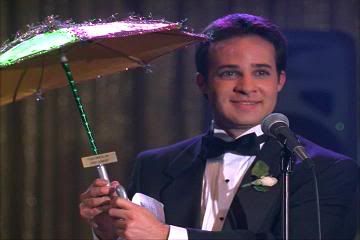
The first stop at cheesiness is Buffy’s receipt of the Class Protector Award from the Prom Committee. The creative team, as usual, diffuses the cheesiness with well-placed humor, and after three years of Buffy’s selfless heroics for the sake of a seemingly ungrateful student body, she finally gets the recognition she’s deserved. Like the earlier episode "Gingerbread," it touches upon what might be considered a glaring discrepancy in the series: the sheer number of battles between the heroes and clearly supernatural beasts vs. the town’s apparent ignorance of anything strange going on. You can’t help but wonder, with three years of Sunnydale High superheroism under her belt, why the sheer numbers of students Buffy had saved hadn’t helped her get a notch or two up the social ladder. With the restraints of cliques and high school social status about to dissipate, the students finally show their true colors. It’s not only a surprisingly affecting scene, but absolutely necessary. Without it, the Scoobies’ recruitment and organization of the senior class at the end of "Graduation Day" would never have made sense.
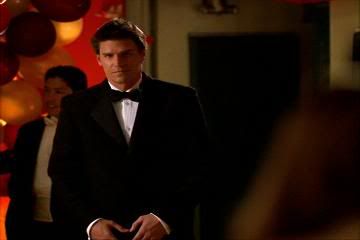
Angel’s appearance in the last few minutes shouldn’t affect you, but it does. You can’t help it. You’re softened a little by Xander’s final peacemaking with Cordelia, reduced to the durability of Nerf by the award ceremony, and when Angel shows up - even though you knew as soon as he broke up with her that he’d show up at the prom anyway - you’re done. It’s over. You’re a weep-monster.
"The Prom" was an example of how Whedon not only wonderfully mixed elements of drama, horror, and humor, but also how he turned the horror genre on its head. Just as Buffy was the young, attractive teenage girl who was predator instead of prey to the monsters and villains of horror and slasher flicks, "The Prom" was both a parody of, and a victorious middle finger to, films like Prom Night and Carrie that made high school proms one of the favorite homes of fictional bloodbaths. It was the perfect embodiment of the conceptual genius behind the series, which is why, in my humble opinion, it deserves the title of Best Buffy ever.
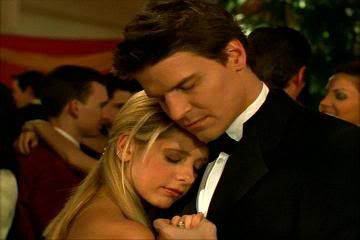
No comments:
Post a Comment